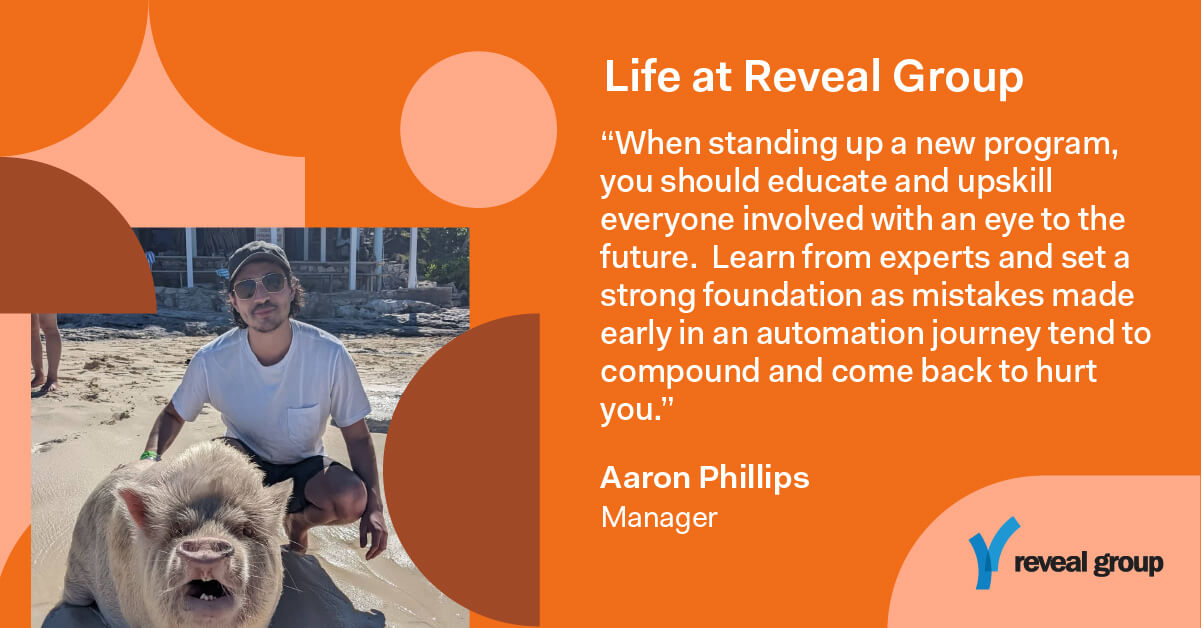
Life at Reveal Group
Aaron Phillips, Manager
Based in Toronto, CAN
Tell me about your background and how you ended up at Reveal Group.
All throughout my Economics degree at McGill my coursework focused on finance and technology. I wanted a career that combined those areas but had no idea what that looked like. My first role was an analyst position at a big mutual fund company doing a large-scale investment book of records implementation. After that, I joined a consulting firm working on similar projects in the space. Here, I had an opportunity to take on a more technical role as a SQL developer. As I worked on various projects the more technical roles were always my favorite and I wanted to lean more and more into tech. Then lo and behold, that’s when I got a LinkedIn message from someone at Reveal Group telling me they were looking for consultants interested in starting up a Canadian office. I jumped at the opportunity; it was an easy choice.
How have you grown during your time at Reveal Group?
Reveal Group did a fantastic job at providing me with a diverse breadth of opportunities across both client and internal projects. I joke with Jamie that there’s a ‘Holy Trinity’ of special projects – the Business Analyst, the Project Manager, and the Developer. At Reveal Group, I get to do all three, which has been amazing. I’ve grown a lot as a technical Project Manager. Project management wasn’t something I had a lot of experience with prior to joining, and it’s so ubiquitous in business. My technical and leadership skills are probably the other two biggest areas I’ve refined at Reveal. A lot of this comes from the opportunity to go into different industries with entirely different kinds of people in Canada and the U.S. I hope to get more global experiences in the future.
What has surprised you about working at Reveal Group?
Several things come to mind. The first was the overall caliber of people here. We have very high-quality people at Reveal Group, which is not something I’ve seen as consistently at other firms. My peers also come from very diverse backgrounds. Honestly, everyone here is full of surprises especially regarding the variety and strength of their skill sets.
I was also surprised by how closely Reveal Group’s working style aligned with my own. We both value a professional, collaborative, informative, and light-hearted workplace. Another thing I appreciate is the flexibility to perform multiple roles on a project. Most roles are solely developers, business analysts, or project managers. As a consultant, you can combine any of the three.
Who has had the most significant impact on your career?
All the managers and seniors throughout my career have had an impact. Having a manager who takes time to mentor and invest in your growth during your formative years is instrumental to a strong career trajectory, and I’ve been privileged enough to have that. Because I’ve seen the impact of a good manager on early development, I try to take things I’ve learned and emulate it for the people I manage.

How have you seen automation impact people and businesses through your projects?
The most important impact for me is always improving the overall quality of peoples’ jobs. Seeing someone who spent all day doing a monotonous task and is then shifted to a role where they’re overseeing robots doing those tasks is rewarding. Automation projects create the opportunity for us to upskill individuals, improve the quality of jobs, and create value for our clients’ organizations. A successful automation project’s impact should always be win-win-win.
After you deliver automations for a client who’d had no experience with RPA before you came in, how do you prepare them to take on the monumental task of managing bots?
Early, honestly engagement, plus the right training gives people the confidence they need to take on a new job. When you parachute people into a project or role without context, it becomes tough for them to succeed. That’s why in transformation projects we try to involve all stakeholders early, easing the transition into that new role. Including them in the process is super important and it’s crucial that people have input and get the training they need to succeed.
What do you want to see for the future of automation?
I have strong opinions on this because I’m a big ‘back to the basics’ guy. The first thing I want to see is that as an industry, we need to focus on producing high-quality and robust code. The commoditization of RPA development led to an overall decrease in code quality leading to costly support. You can bring in all the fancy hyperautomation tools you want, but it won’t be sustainable if your core automations break every two seconds.
I’d also like to see the industry improve how we create business cases. The cost of managing and maintaining automations is often overlooked. Every automation manager needs to understand the maintenance cost of a given solution much like the accounting concept of ‘carrying cost’. In the intelligent automation ‘supply chain’, you hold on to your finished goods and maintain them indefinitely after production. Everyone likes to show an impressive business case where automations can save millions of dollars, but that business case also needs to offer a cost-efficient way to maintain the solution and actualize that benefit.
Another trend I’d like to see are simplified operations. For example, reduce the number of vendors: by sticking with one partner and one or two all-encompassing technologies, you minimize time spent on vendor management. Limiting the number of vendors will give you more time to operate your program. Only pull in a new specialty vendor if the wholistic business case really warrants it.
The last thing I’d like to see for the future of automation is an increased focus on user experience. A big reason implementations are unsuccessful or hit hurdles is poor user experience. Even if an automation is technologically exciting and interesting, you need to focus on the user experience, or no one will ever use it.
The future of automation is not just about artificial intelligence and innovation. We’re going to have AI models whose outputs feed into other AI models and so on leading to AI making complete human-like decisions. That’s going to be huge for the future of automation. But, before the industry can take full advantage of the breakneck pace of innovation, we need to establish solid foundations.

People at Reveal Group come from many different backgrounds. What advantage does your business background give you in your role?
Sometimes, in digital transformation the business reason for doing things gets lost. My business background helps remind me that my role at Reveal Group is to generate revenue, by delivering high quality work for clients and enabling peers to do the same. People get overly invested or hyper-focused on the technology and solution design and lose sight of the fact that our role is to produce a specific business outcome for our clients and our firm. Everything is tied to those outcomes – that’s why we’re here. My background helps me keep business goals front of mind.
What are some downsides of automation, and how can the industry overcome them?
Some downsides include the high cost of implementation and maintenance. To reduce implementation costs, you need to concentrate on building internal capability and honing your craft. You can’t plan to have consultants do it for you forever. The cost overruns will be difficult to reign in if you continuously rely on a partner. The optimal use of a partner has them focusing on showing you the ropes through training and upskilling internal resources. There should be a well-planned handoff and knowledge transfer between discovery, delivery, and production support teams, whether internal or external.
Even today there is a fundamental misunderstanding about how to start your automation journey. Even with a pilot or proof of concept you must establish a well-defined operating model, methodologies, and training early on. It is the best way to set yourself up for long term success. When standing up a new program, you should educate and upskill everyone involved with an eye to the future. Learn from experts and set a strong foundation as mistakes made early in an automation journey tend to compound and come back to hurt you. Use experts to help scope and define the success in a pilot project, ensuring it aligns with organizational goals.
What does life at Reveal Group mean to you?
I’ve been at Reveal group for four years, which is crazy to think about. To me, being at Reveal Group is being part of a team of like-minded individuals, passionate about delivering quality work and driving real tangible outcomes. It’s being part of an organization that accepts, challenges, and supports me.
One of Reveal Group’s company values is ‘Always improving, never settling’. How have you seen the company improve during your time here?
Two things come to mind. I was one of the first three consultants hired in Canada. The growth we’ve seen since then has been substantial. Seeing us scale and improve internal processes, invest in new technologies, and bring on people to support demand has been impressive. The scaling of our operations has been such a team effort, one I’m proud to have been personally involved with. The other example is the development of our accelerator tools to support client work. When we think of a better way to do something, we don’t just talk about it. We get down and do it, then turn it into a repeatable methodology or product. It’s very cool to see us take internal tools we’ve developed to market as polished products.
Younger generations are generally more accepting of technology because they’ve grown up in a digital age. As the last wave of ‘Boomers’ is about to exit the workforce and leave their executive positions to Generation X and Millennials, do you think this change will impact the automation industry?
No, I don’t think it will have a huge impact. We assume future generations will embrace change, especially in technology. Using myself as an anecdotal example, I didn’t jump onto the social media train, and when the UI of a product changes, I complain. With that in mind, this resistance to change will ring true for all generations as we age. We all think we won’t complain about change, but we will. It’s like that Abe Simpson quote, “I used to be with ‘it,’ but then they changed what ‘it’ was. Now what I’m with isn’t ‘it’ anymore, and what’s ‘it’ seems weird and scary. It’ll happen to you!”. I’m in my 30s now and I already feel like a ‘Millennial Boomer,’ so it’s coming for us all.
